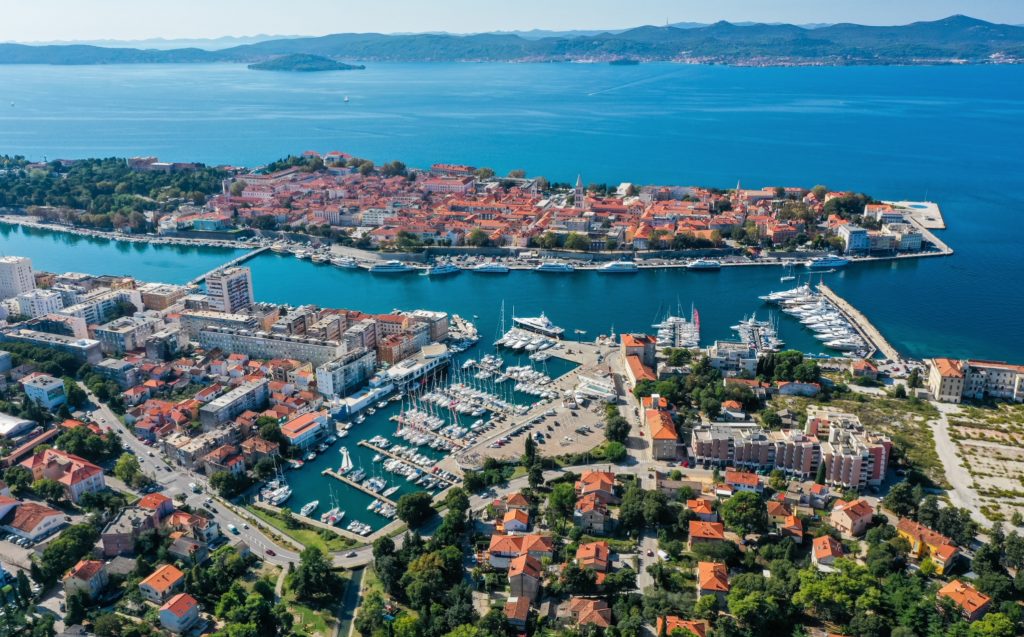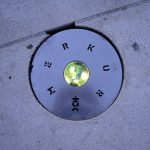Zadar is the oldest continuously-inhabited Croatian city. According to some research and discoveries, Zadar was founded around the year 1000 BC, making it one of the most ancient cities in Europe, even older than Rome!
The city has witnessed and bears the inheritance of the Roman Empire, the Venetian Republic, has passed through Austrian and Italian domination, then was part of the Yugoslavian Federation and finally took its place in the independent Republic of Croatia.
Destroyed and rebuilt several times through its turbulent and yet rich history, Zadar has always risen stronger and ever more beautiful. That is why even a simple stroll in this city will strike you with wonder, curiosity, fondness, and of course…lots of fun!
10.00 a.m – 13.00 p.m.
We recommend you make a grand entrance and enter Zadar from the historical Land Gate, located by the Foša harbor. The Venetians built the gate in 1543 and feature a huge triumphal arch and two side arches, all decorated with images of saint Chrysogonus, one of the four patrons of the city. The winged lion of St. Mark hovering over the central arch is a reminder of Venice’s long rule over Zadar. So, make a nice roar and enter the city.
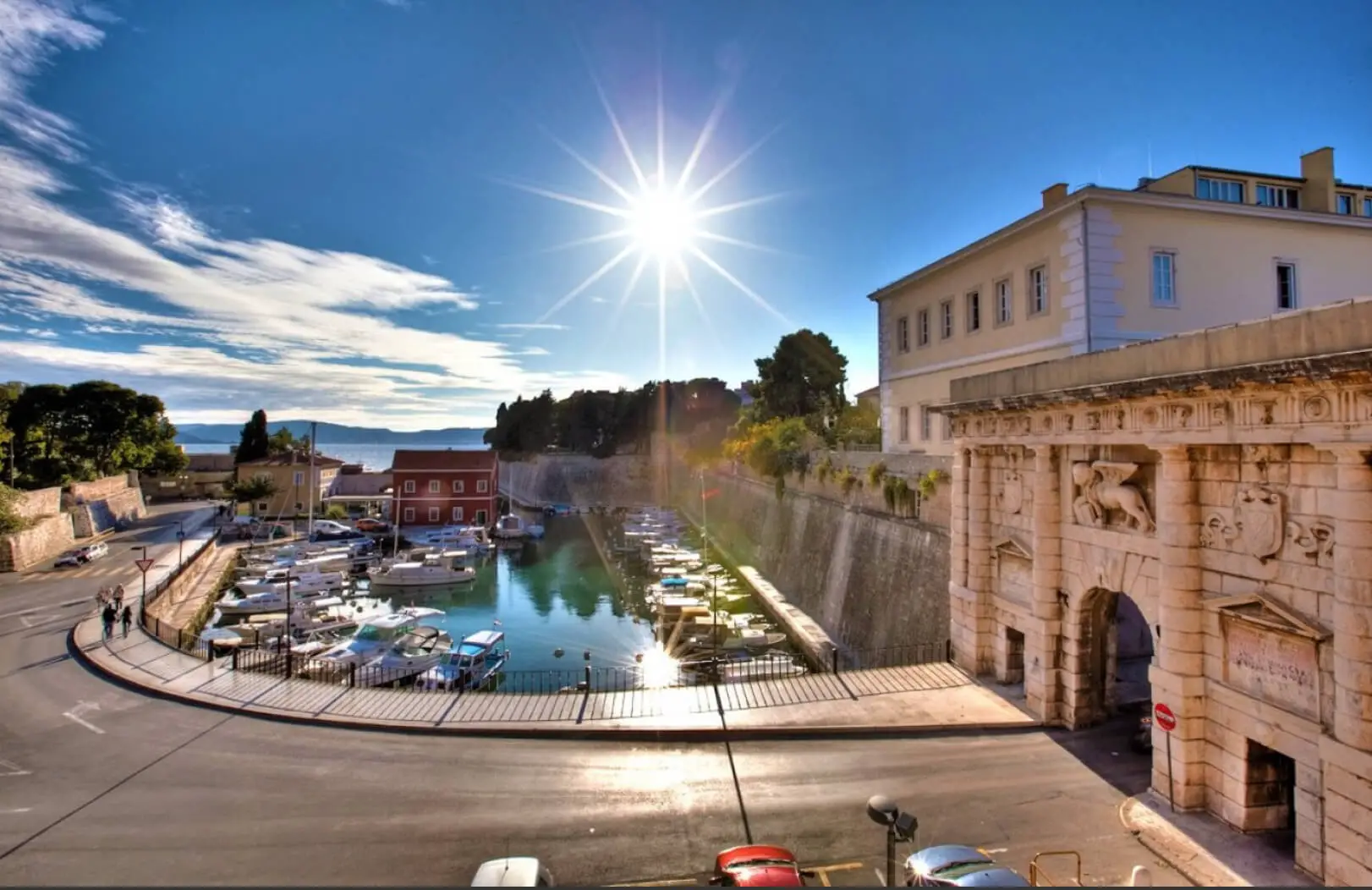
Foša harbor (Image: Zadar Tourist Board/Screenshot)
As soon as you pass under the arch, almost immediately on the right, you find a narrow passage that takes you to the Five Wells Square, located between the medieval City Walls and the Renaissance bastion Grimani, hosting the oldest park in Croatia named after Queen Jelena Madije. The wells no longer provide drinking water, but they serve as “gates” for skateboarders, who like to practice their techniques during the daytime.
However, in the evening, this square is transformed mainly thanks to the two clubs that excel in Zadar’s nightlife. Ledana Lounge bar is open from 8 am and offers refreshment under the trees during the summer heat, whereas evenings will give place to an exciting and chilling atmosphere on one of three terraces where you can indulge in some live music and concerts as well as huge theme party nights.
Svarog Bar instead offers theme music evenings of R’n’B, Salsa, and house music directly on the square.
Starting from The Petar Zoranić Square, you will admire the Two Palaces‘ recently renovated art and cultural complex. Next to this, there is the Church of St Simeon, where the main Altar holds a silver casket with the relics of St Simeon, dating back to 1380.
Then, you can start walking along the main road to get to the People’s Square in Zadar, the Platea Magna, today’s administrative center of the City, together with the exhibition space City Loggia. From the People’s Square, streets lead in four main directions: Kalelarga, the Seafront (Riva), the pedestrian bridge, and the market. On the opposite side of the Square, you can admire the City Sentinel, dating back to the second half of the 16th century, with a clock tower that has stayed in continuous operation since 1803.
In People’s square, you will find one of the historical bars in Zadar, Kavana Sveti Lovre. You will barely ever find free places outside, but few know that the inside is surprisingly located in one of the oldest buildings in Zadar, an 11th-century church.
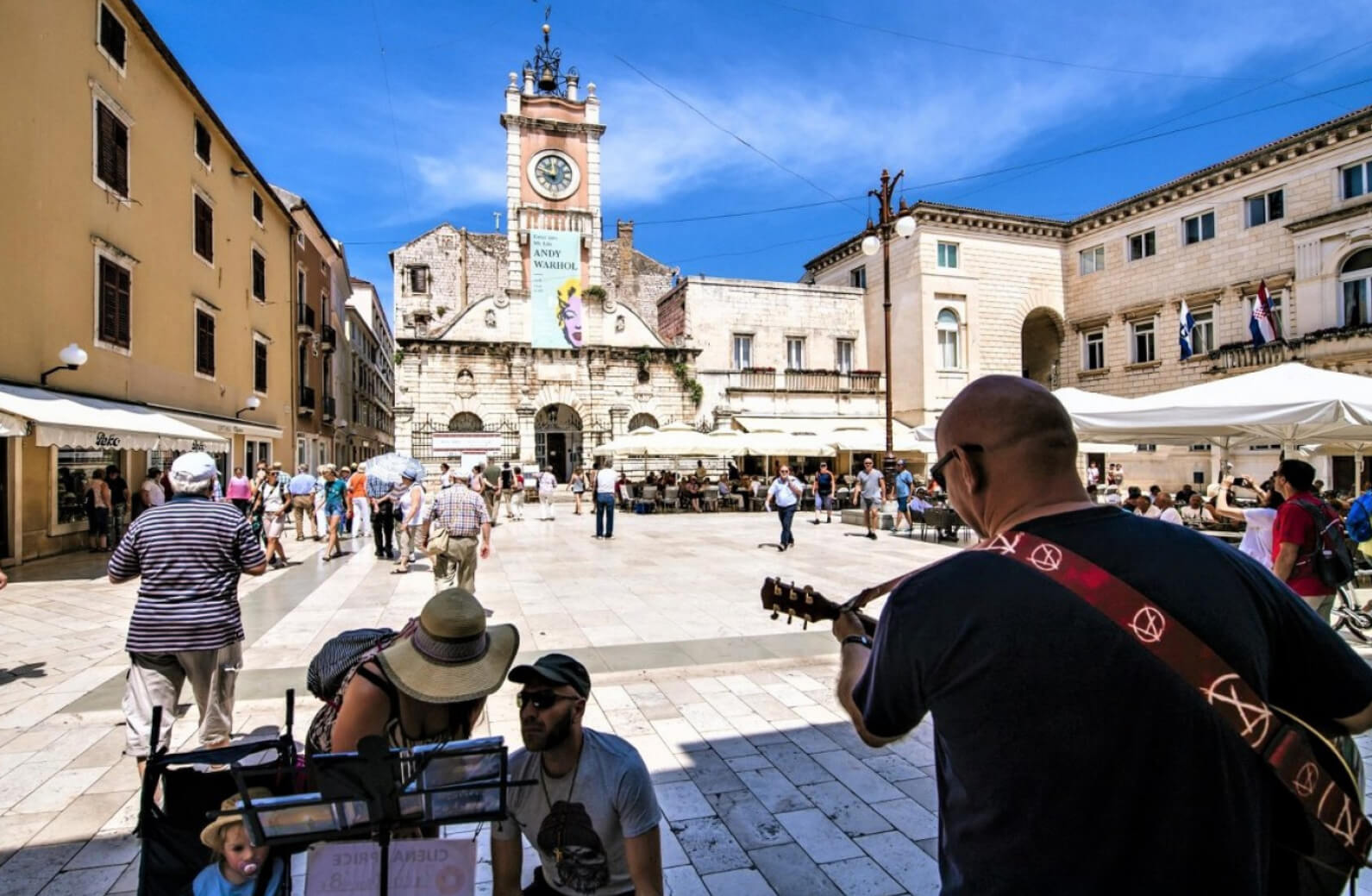
People’s Square, the clock tower, Kavana Sveti Lovre (Image: Zadar Tourist Board/Screenshot)
From there, you will move your first steps towards Kalelarga, the city’s main street, not always wide as the name suggests, but definitely a cult space where locals always meet someone they know. Officially called Široka ulica, it is mentioned in many songs, known to be the place of all city gossip or news. If you walk here on a Saturday morning (a time called Subotnja Špica) with fashionable outfits, you can be pretty sure the next day you will appear in some photo gallery of the most popular online local newspapers.
We recommend you to take a sweet stop at the beginning of the Kalelarga and delight yourself at Art Hotel Kalelarga. The Gourmet area is offering a relaxing and enjoyable experience of a unique Dalmatian atmosphere. Here you can start your day with coffee and fresh delicious pastries.

Fresh pastries at Art Hotel Kalelarga (Image: Art Hotel Kalelarga/Facebook)
From there we suggest you dive into the narrow streets and head towards the city market, one of the most picturesque and colorful ones on the seaside. Here, fishermen supply fresh catches every day, but you’ll also find herbs, fruits, olive oil, and cheese in the outdoor stalls, as well as an indoor meat market. The best time for a visit is between 6 a.m. and 1 p.m., just do not forget to haggle over the price.
Then you may return to the right path or Kalelarga, and reach the St. Donatus Church dominating the ancient Roman Forum, which was built between the 1st century BC and the 3rd century AD.
The Church of St Donat in Zadar has long been desacralized, meaning no liturgies are held here. But thanks to its exceptional acoustic characteristics, it is the venue for music festivals and in particular the Musical Evenings of St. Donatus that are held in July and August every year.
On one side of the Forum you will find the Church and Monastery of St Mary, founded in 1066, and most of all famous for the Permanent Exhibition of Religious Art – the Gold and Silver of Zadar – with around 200 artifacts that date from the 8th to the 18th centuries. Close to the Monastery, there is the Archeological Museum of Zadar.
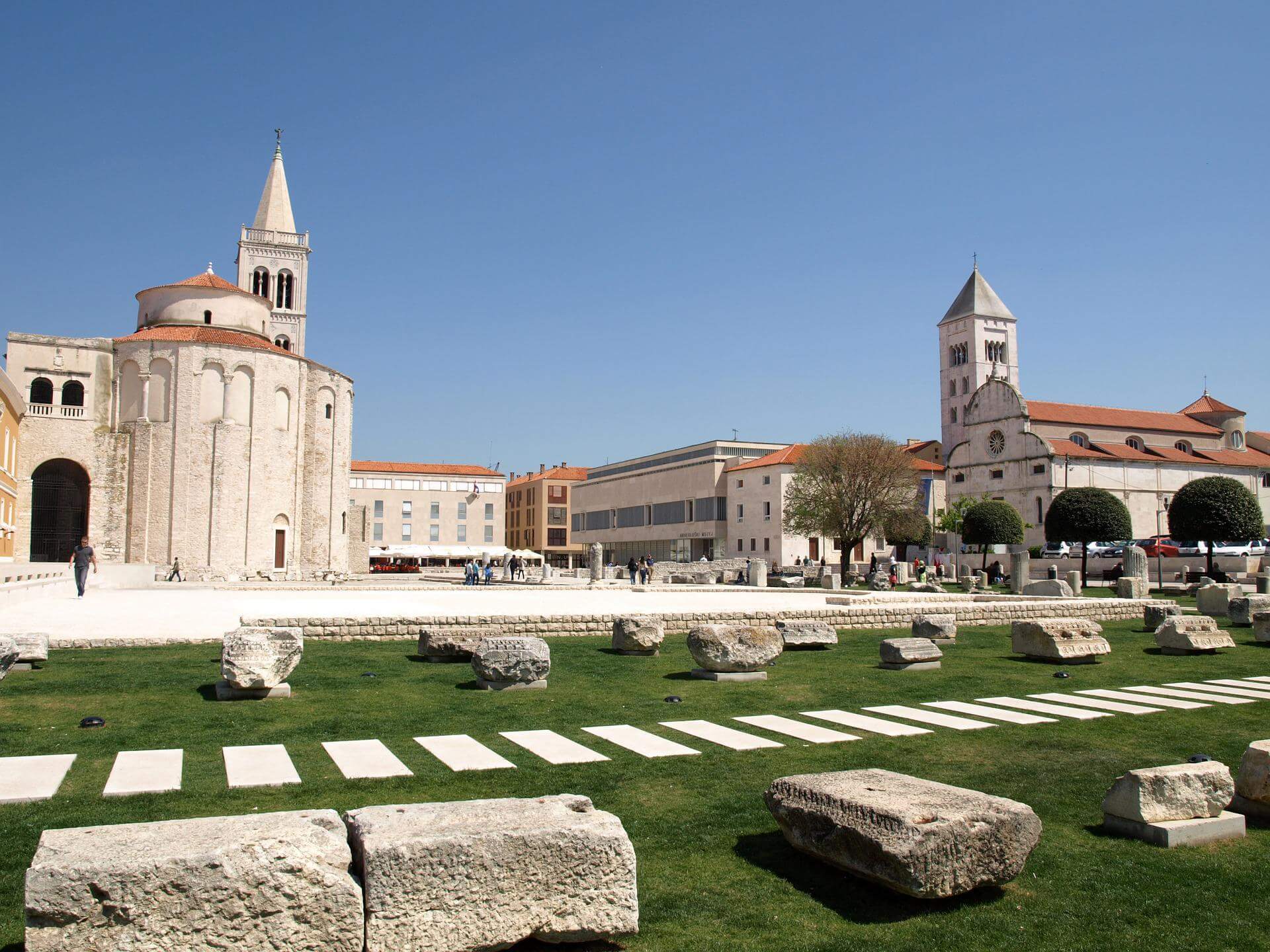
St. Donatus, Roman Forum, and St. Mary Church (Image: Zadar Tourist Board/Screenshot)
If you don’t’ want to miss a 360° view for only 15 KN (2 euros), then climb up the Anastasia Bell Tower, 56 meters tall and about 200 steps to climb. But take care of the wind up there!
Do not forget then to visit the largest church in all of Dalmatia, the Cathedral of St Anastasia, a monumental Romanesque building. It’s closed to tourists on Sundays and remember that rules prohibit bare shoulders and shorts.
13.00-15.00 p.m.
For lunch, we recommend taking a break in the historic district of Varoš, where you can dive into scenes of everyday social rituals and endless chit-chat (ćakula). There is a large selection of top restaurants, dynamic coffee bars for young people, and cult places for socializing.
Take a moment to fully enjoy a meal in the restaurant and pizzeria 4 Kantuna located right between the four corners of the district and delight yourself with a Dalmatinski pijat and a Ribarska teća alla Četiri kantuna. You won’t regret it!
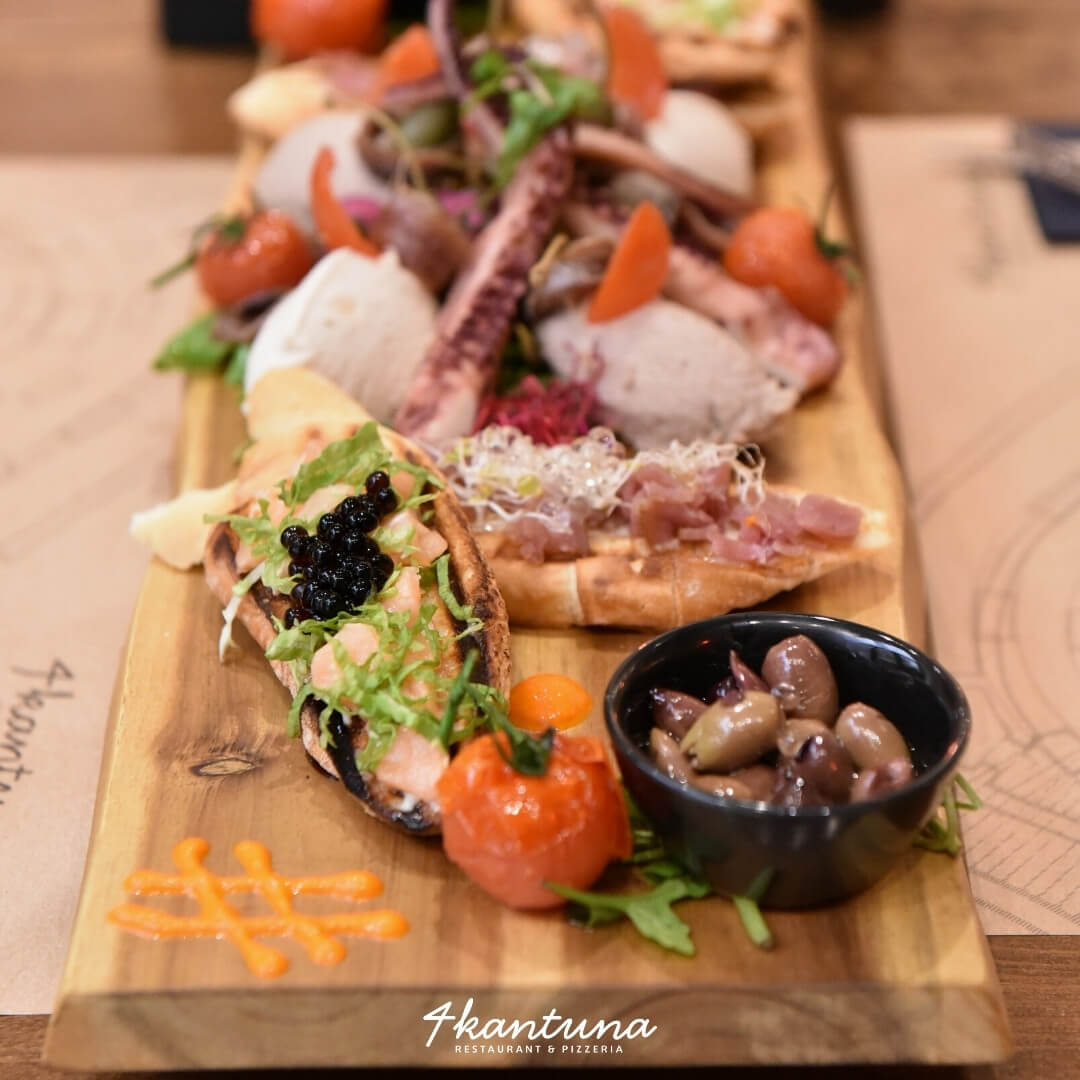
Dalmatinski Pijat (Image: 4 Kantuna Restaurant/Facebook)
15.00-17.00 p.m.
In the afternoon we propose different options according to your interests and your level of fatigue.
Category: lazy but curious.
Stay in the center and visit The Museum of Ancient Glass, a contemporary and unique archaeological museum, focused on ancient glass. It presents a unique collection of over 5000 various glass objects dating to ancient times. They also organize glassblowing demo workshops where replicas of ancient glass are made by using the free-blowing technique. During the summertime, they are open until 9 pm.
After the visit, you can delight yourself with ice cream from the best-known Slastičarnica Donat in front of the Cathedral of St. Anastasia. Otherwise, you can sit on the western Riva, in Gelateria Eva, where they serve both ice cream and vegan sorbet gluten-free.
Don’t forget to drop in the Maraska Shop where you can buy the original Maraschino, a liqueur obtained from the distillation of dalmatian Marasca cherries, or Pelinkovac, another liqueur produced according to a traditional maceration method and using selected curative herbs, such as Pelin. The company Maraska offers also a wide variety of different fruit juices and nectars (Maraska Shop at Ul. Nadbiskupa Mate Karamana 3).
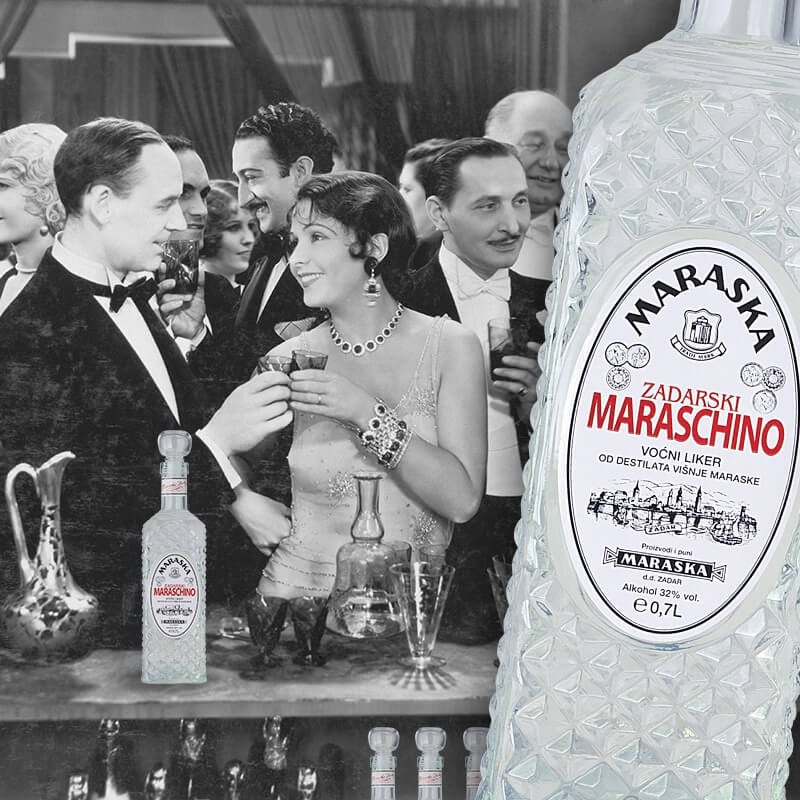
Maraschino Ad (Image: Maraska/Facebook)
Category: lazy and suffering heat.
Walk to the town beach of Kolovare and enjoy as locals do. The pebble beach and piers are also equipped with deckchairs and sports gear to rent, bars, and children’s activities. From here you can walk back to the Land Gate, the Fosa harbor, and admire the City Walls from another perspective.
Category: active and never tired
Enjoy a few hours in Preko, on the island of Ugljan, reachable by a no-car boat from Liburnska Obala with the Jadrolinija ferries (ticket office, Liburnska Obala, 7). The routes are very frequent and the journey takes about 15/20 min for a 38 Kn return ticket. Here you can find the timetable. After admiring the shore of Zadar from the sea, you will then enjoy a very lively town full of ice cream bars, pekare (bakeries), restaurants, and activities. In the old town of Preko, you cannot fail to catch sight of the small island of Galevac or so-called Skoljic, which is only 80 m from the shore and is covered by lush vegetation that hides, but not entirely, the beautiful Franciscan Monastery dating back to the fifteenth century. On the islet you can get literally on foot as the depth of the sea between the shores does not fall below 175 cm.
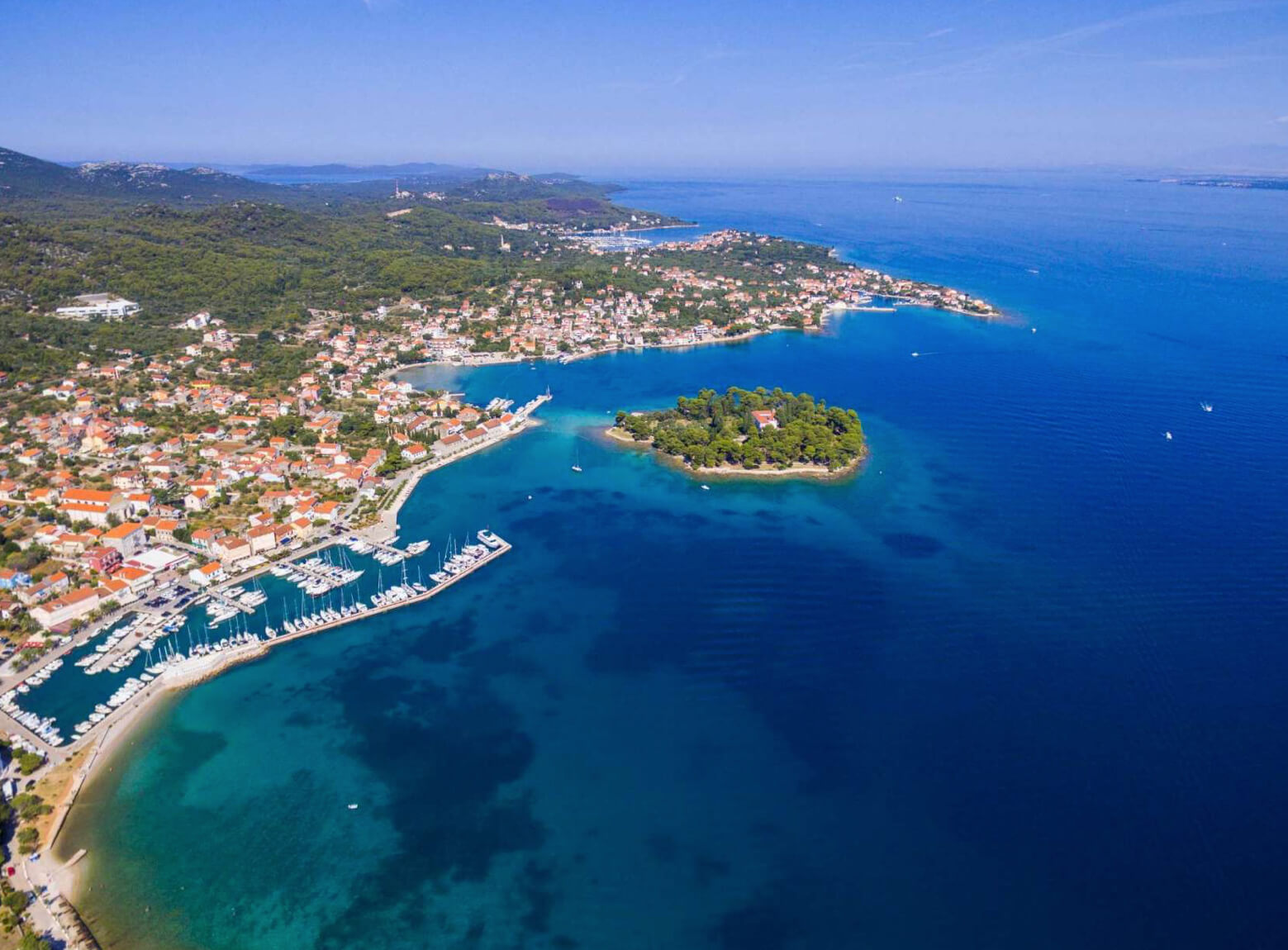
Islet of Galevac – Skoljic (Image: Preko Tourist Board/Screenshot)
19.00-21.00 p.m.
Regardless of the category, you belong to, remember to come back in time on the shore of Zadar by 19.30 and walk up to the Sea organ and Greeting the sun, the two new MUST DO in Zadar. We’ve left these to the end of our day for a very specific reason.
Whether you have a romantic soul or not, the sunset is always a spectacular event. In Zadar, sunsets are the best on the Adriatic coast. No wonder the famous director Alfred Hitchcock declared: “Zadar has the most beautiful sunset in the world, more beautiful than the one in Key West, in Florida, applauded at every evening”.
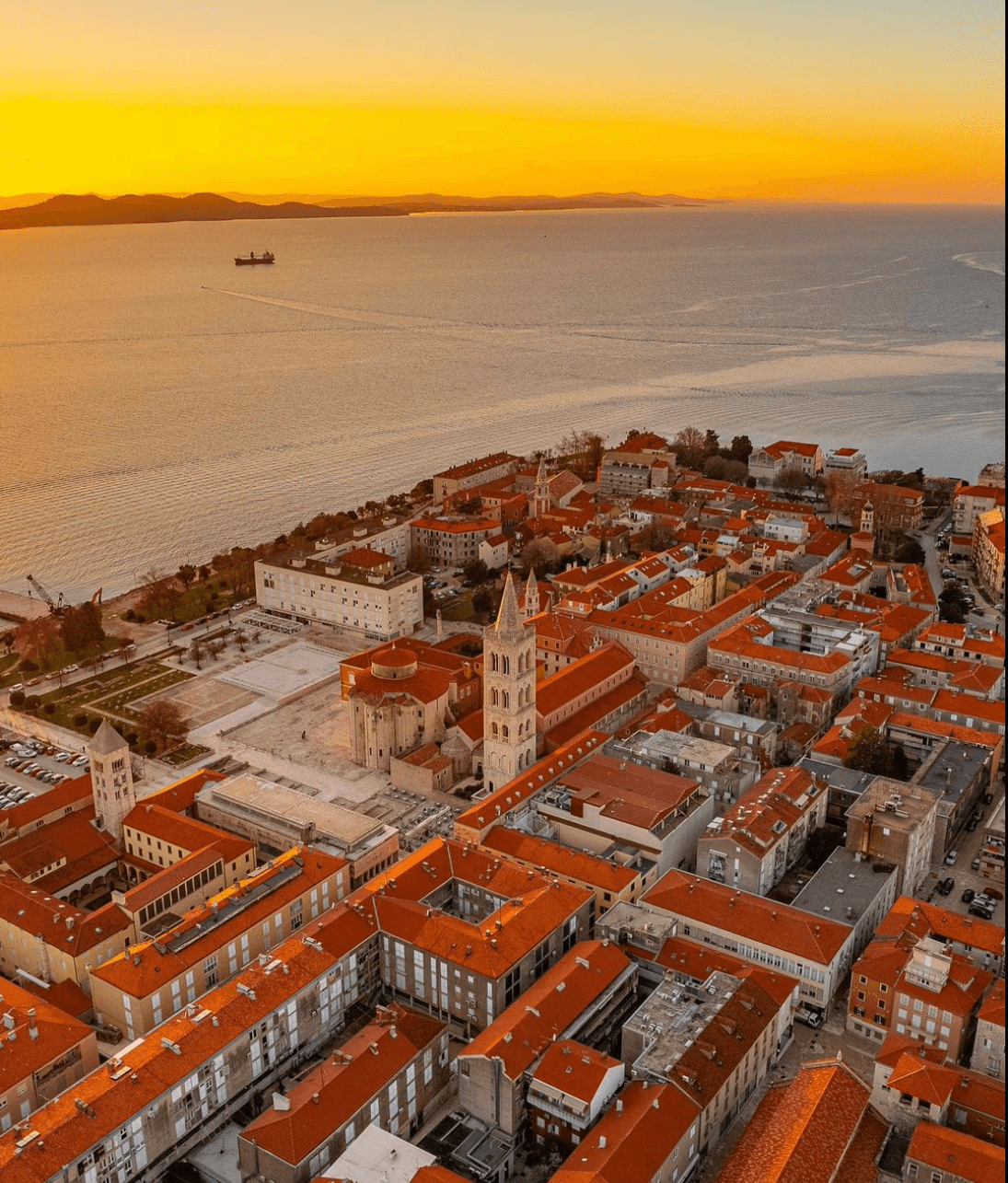
Zadar’s sunset (Image: Like Zadar/Facebook)
The Sea Organ is a unique blend of architecture and music. It stretches out in open water for about seventy meters from the Zadar waterfront (Riva), located at the western point of the city Peninsula. Here, below the level of the lowest low tide, 35 pipes of various lengths, diameters, and slopes have been installed. While the most beautiful sunset spreads over the horizon, the game of lights of the Greeting to the Sun starts. This contemporary installation is made of 300 multi-layered glass solar panels in the shape of a circle with a 22-meter diameter. Throughout the day, it collects the energy of the Sun and transforms it into electricity, which is then used by the installation and its surroundings throughout the night.
Besides the main circle representing the Sun, looking from the west side, there are similar smaller circles representing other planets of the Solar System. The size of the Sun and planets are proportional, as well as the distance from the center of each plate. On the metal ring that frames the Sun are inscribed the names of all of the saints after which churches on the Zadar peninsula have been named.
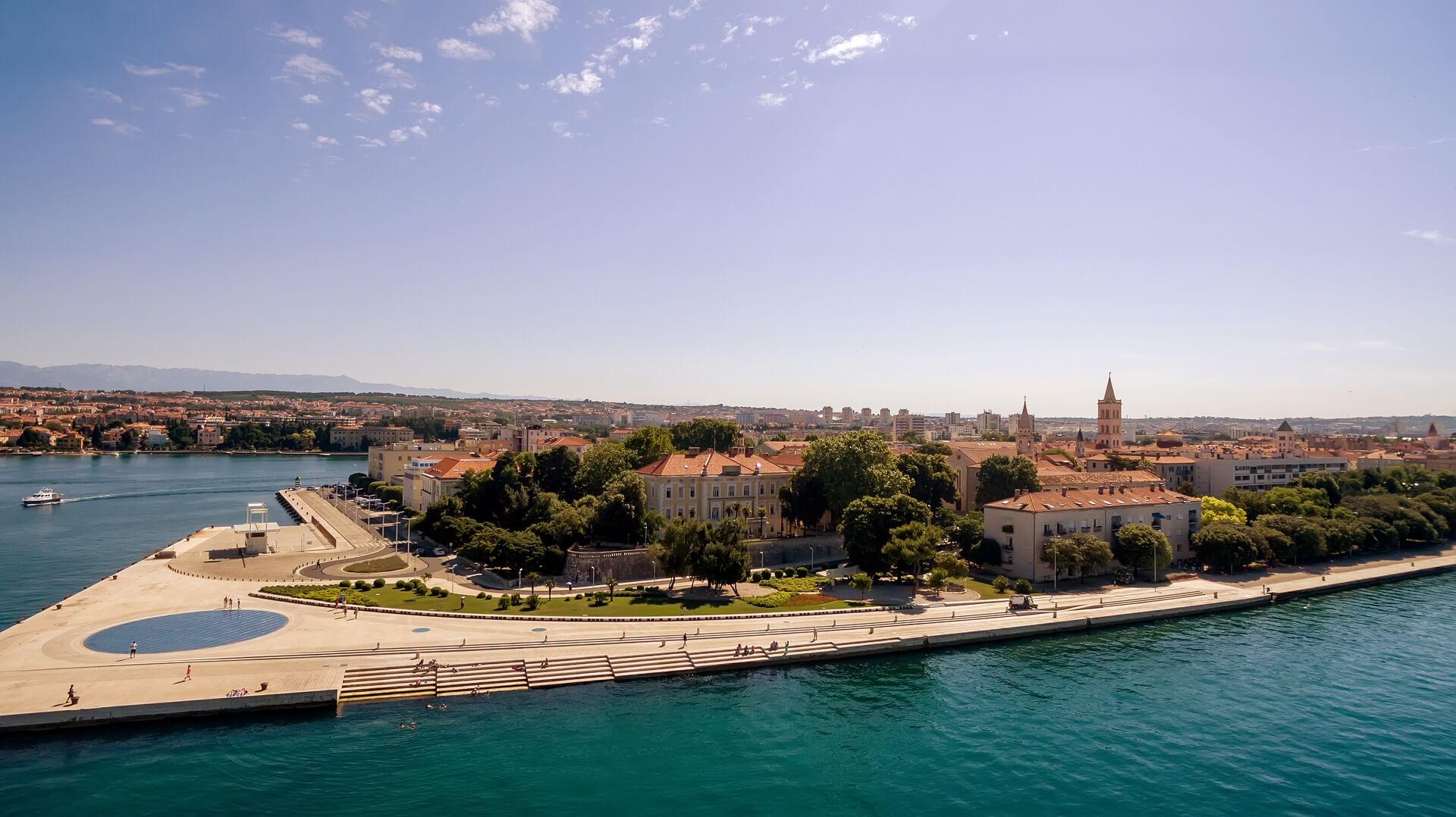
Riva seafront with Sea Organ and Greeting to the sun (Image: Pixabay)
21.00-23.00 p.m.
With fatigue in your legs and eyes full of beauty, you can enjoy an excellent dinner from Cookhouse and club Harbor. It is located on the north side of the natural cove of Zadar port, on the other side of the pedestrian bridge. Once there was the rowing center here, and now this recently built cafe/restaurant is enjoying great success due to its strategic position, a place from which you can admire the illuminated city center and especially the city walls.
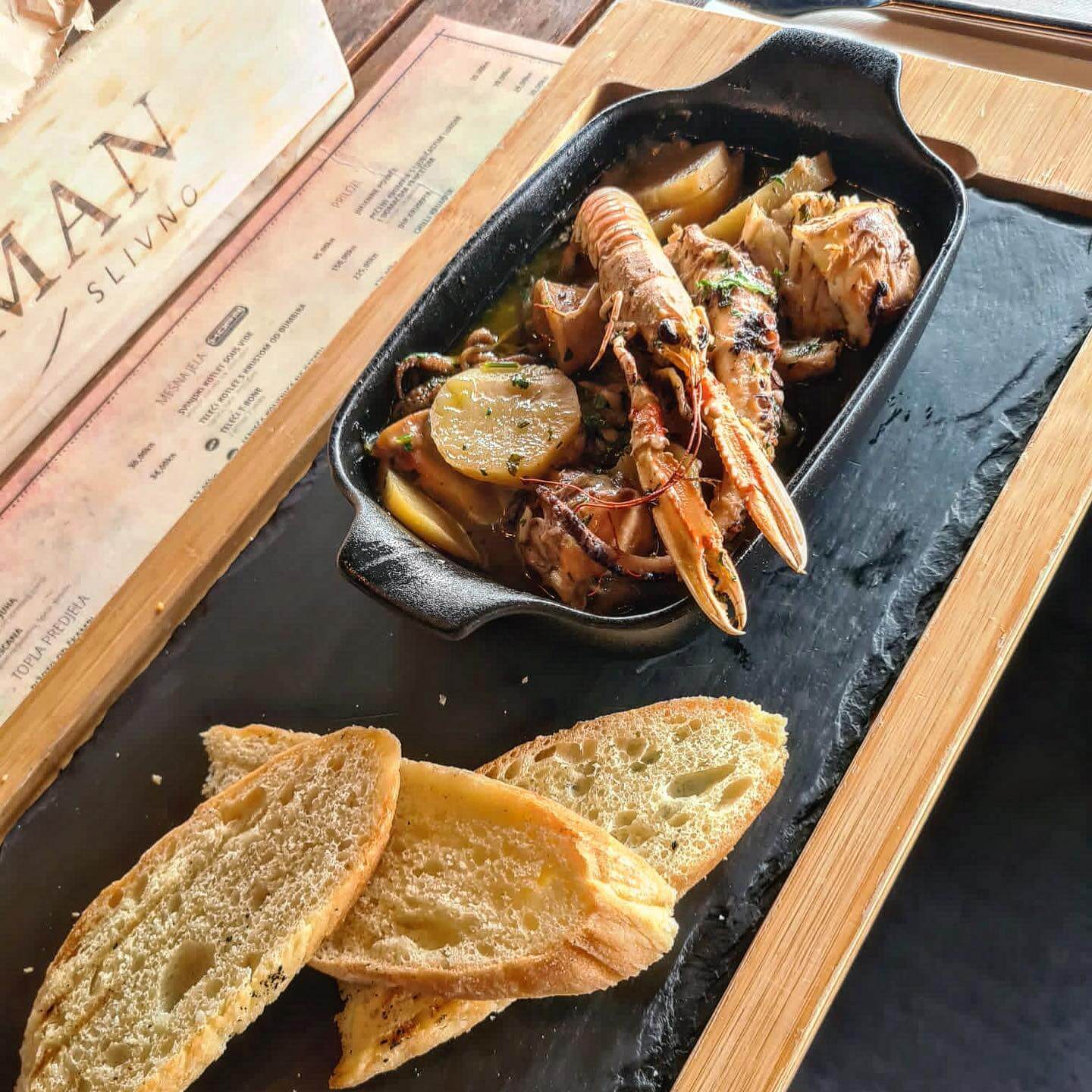
Delicious food at Harbor. (Image: Cookhouse and club Harbor/Facebook)
23.00 p.m – early hours
Once the sun sets and your belly is full, it’s time to hit the town. You can choose to explore the nightlife all over the historical peninsula and dance the evening away at the Svarog Dance & Night Club at Five Wells Square (that we have mentioned before) and at the Ledana Lounge & Bar in the nearby Queen Jelena Madije Park.
You can choose instead to go back to Varoš, the historical district in the south-eastern part, where you can stumble across random parties (the so-called feštice) that sometimes start in the afternoon and simply continue throughout the night, usually on Fridays.
Or you can really chill out on great sofas and pillows in Garden Lounge bar and restaurant, the open terrace bar facing relaxing views from Zadar’s city walls.
Having entered the city by the Land Gate, now, if you want, you can leave Zadar by the sea with the Barkajoli, the Rowing Boatmen that, from early morning to the late evening, take passengers and tourists with a little rowing boat across the Zadar peninsula to the mainland and back. This tradition is passed down from father to son, from one generation to another.
And there you have it, the best 24 hours in Zadar very well spent, hopefully showing just a small taste of what the city can offer. On the other hand, 3000 years of history cannot be lived in just 24 hours, don’t you think?
For more on travel in Croatia, follow TCN’s dedicated page.

